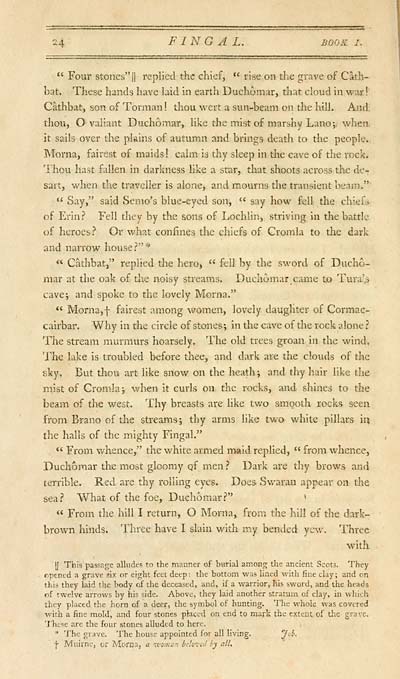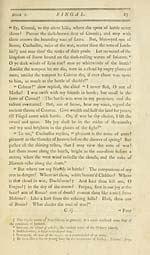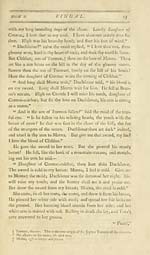Download files
Complete book:
Individual page:
Thumbnail gallery: Grid view | List view

F ING A L.
" Four stones" il i-eplied the chief, " rise on the grave of Cath-
bat. These hands have laid in earth Duchomar, that cloud in war!
Cathbat, son of Torman ! thou wert a sun-beam on the hill. And
thou, O A'^aliant Duchomar, like the mist of marshy Lano;. when
it sails over the plains of autumn and brings death to the people.
Morna, fairest of maids ! calm is thy sleep in the cave of the vock.
'i'hou hast fallen in darkness like a star, that shoots across the de-
sart, when the traveller is alone, and mourns tlie transient beam."
« Say," said Semo's blue-eyed son, " say how fell the chiefs
of Erin? Fell they by the sons of Lochlin, striving in the battle
of heroes? Or what confines the chiefs of Cromla to the dark
and nan-ow house?"*
« Cathbat," replied the hero, " fell by the sword of Ducho-
mar at the oak of tlie noisy streams. Duchomar came to Tura'.^
cave; and spoke to the lovely Morna."
" Morna,f fairest among women, lovely daughter of Cormac-
cairbar. Why in the circle of stones; in the cave of the rock alone ?
The stream murmurs hoarsely, The old trees groan in the wind.
The lake is troubled before thee, and dark are the clouds of the
sky. But thou art like snow on the heath; and thy hair like the
mist of Cromla; when it curls on the rocks, and shines to the
beam of the west. Thy breasts are like two smooth rocks seen
from Brano of the streams ; thy arms like two white pillars in
the halls of the mighty Fingal."
*' From whence," the white armed maid replied, " from whence,
Duchomar the most gloomy qf men ? Dark are tliy brows and
terrible. Red are thy rolling eyes. Does Swaran appear on the
sea? What of the foe, Duchomar?" *
«« From the hill I return, O Morna, from the hill of the dark-
brown hinds. Three have I slain with my bended yew. Three
with
li This passage alludes to the mnnner of burial among; the ancient Scots. They
cpencd a grave six or eight feet deep: the bottom v/as lined with fine clay; and on
this they laid the body of the deceased, and, if a warrior, his sv/ord, and the heads
of twelve arrows by his side. Above, they laid another stratum of clay, in which
they placed the horn of a deer, the symbol of hunting. The whole was covered
with a fine mold, and four stones placed on end to mark the extent of the grave.
These arc the four stones alluded to here.
* The grave. The house appointed for all living. Job.
f Muirne, or Morna, a ivoman bdovcd by all.
" Four stones" il i-eplied the chief, " rise on the grave of Cath-
bat. These hands have laid in earth Duchomar, that cloud in war!
Cathbat, son of Torman ! thou wert a sun-beam on the hill. And
thou, O A'^aliant Duchomar, like the mist of marshy Lano;. when
it sails over the plains of autumn and brings death to the people.
Morna, fairest of maids ! calm is thy sleep in the cave of the vock.
'i'hou hast fallen in darkness like a star, that shoots across the de-
sart, when the traveller is alone, and mourns tlie transient beam."
« Say," said Semo's blue-eyed son, " say how fell the chiefs
of Erin? Fell they by the sons of Lochlin, striving in the battle
of heroes? Or what confines the chiefs of Cromla to the dark
and nan-ow house?"*
« Cathbat," replied the hero, " fell by the sword of Ducho-
mar at the oak of tlie noisy streams. Duchomar came to Tura'.^
cave; and spoke to the lovely Morna."
" Morna,f fairest among women, lovely daughter of Cormac-
cairbar. Why in the circle of stones; in the cave of the rock alone ?
The stream murmurs hoarsely, The old trees groan in the wind.
The lake is troubled before thee, and dark are the clouds of the
sky. But thou art like snow on the heath; and thy hair like the
mist of Cromla; when it curls on the rocks, and shines to the
beam of the west. Thy breasts are like two smooth rocks seen
from Brano of the streams ; thy arms like two white pillars in
the halls of the mighty Fingal."
*' From whence," the white armed maid replied, " from whence,
Duchomar the most gloomy qf men ? Dark are tliy brows and
terrible. Red are thy rolling eyes. Does Swaran appear on the
sea? What of the foe, Duchomar?" *
«« From the hill I return, O Morna, from the hill of the dark-
brown hinds. Three have I slain with my bended yew. Three
with
li This passage alludes to the mnnner of burial among; the ancient Scots. They
cpencd a grave six or eight feet deep: the bottom v/as lined with fine clay; and on
this they laid the body of the deceased, and, if a warrior, his sv/ord, and the heads
of twelve arrows by his side. Above, they laid another stratum of clay, in which
they placed the horn of a deer, the symbol of hunting. The whole was covered
with a fine mold, and four stones placed on end to mark the extent of the grave.
These arc the four stones alluded to here.
* The grave. The house appointed for all living. Job.
f Muirne, or Morna, a ivoman bdovcd by all.
Set display mode to: Large image | Transcription
Images and transcriptions on this page, including medium image downloads, may be used under the Creative Commons Attribution 4.0 International Licence unless otherwise stated. ![]()
| Early Gaelic Book Collections > Ossian Collection > Poems of Ossian, the son of Fingal > (36) |
|---|
| Permanent URL | https://digital.nls.uk/77922733 |
|---|
| Description | Selected books from the Ossian Collection of 327 volumes, originally assembled by J. Norman Methven of Perth. Different editions and translations of James MacPherson's epic poem 'Ossian', some with a map of the 'Kingdom of Connor'. Also secondary material relating to Ossianic poetry and the Ossian controversy. |
|---|
| Description | Selected items from five 'Special and Named Printed Collections'. Includes books in Gaelic and other Celtic languages, works about the Gaels, their languages, literature, culture and history. |
|---|

